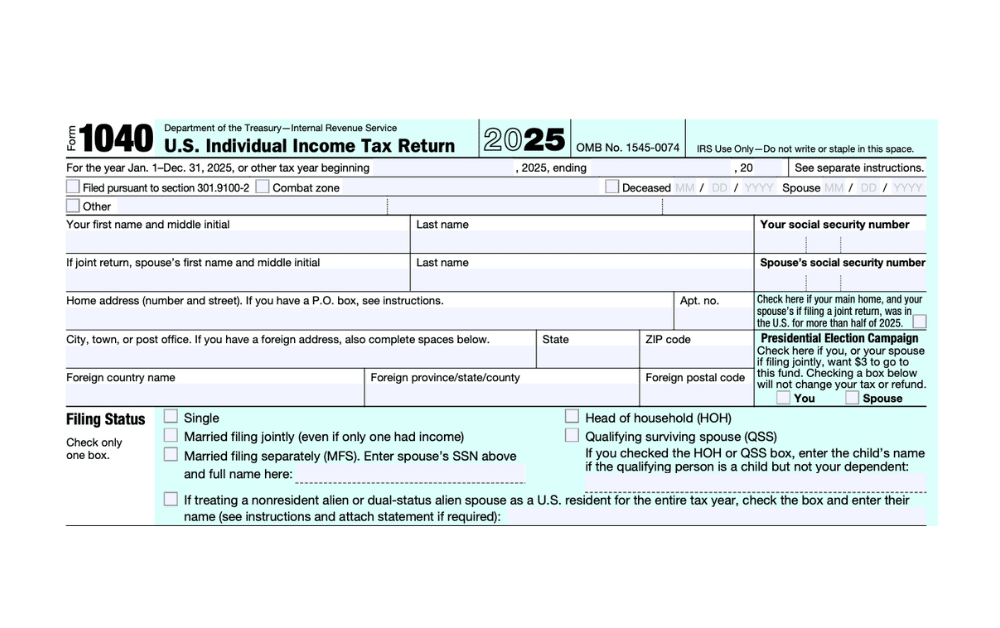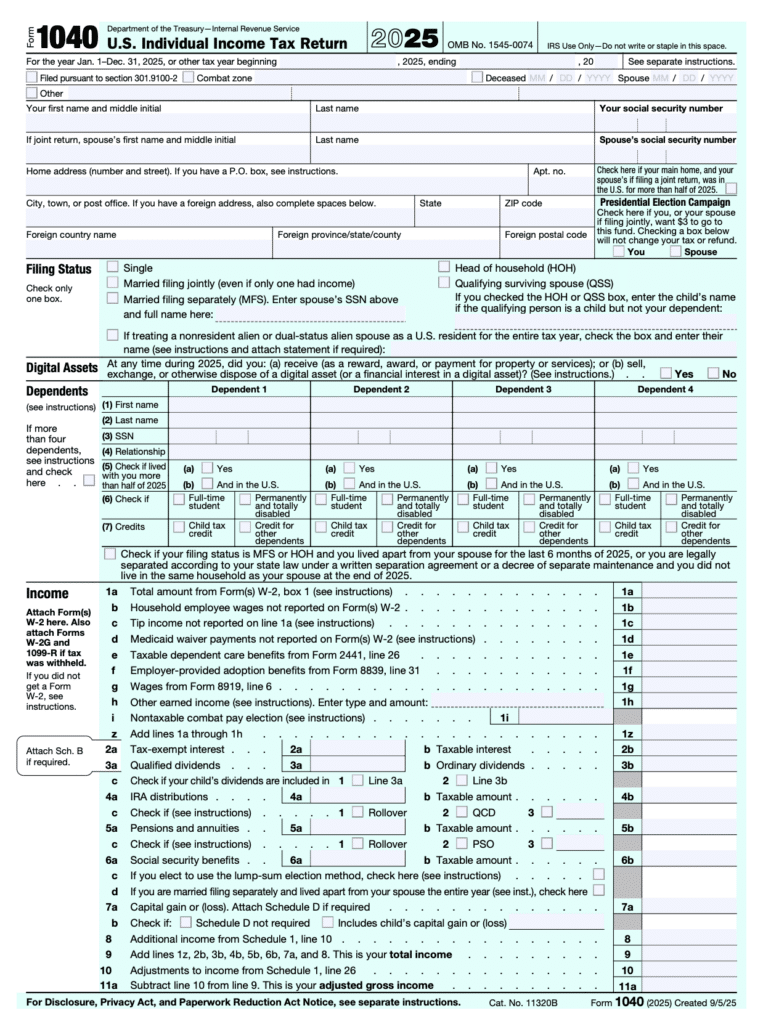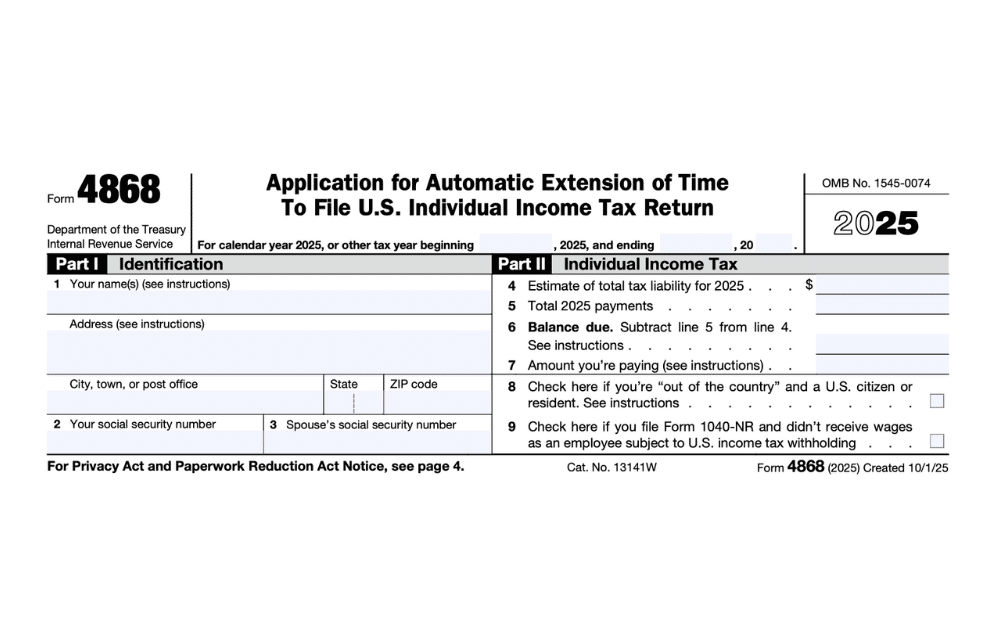Form 1040 for US Expats: 2026 Filing Made Simple

Nearly 9 million Americans live abroad, and most end up owing $0 in US taxes when they file correctly. The key is understanding which forms to complete and which exclusions to claim.
Do US expats need to file Form 1040? Yes, you must file Form 1040 as a US citizen abroad or a Green Card Holder, regardless of where you live or work. However, here’s the relief—US tax law provides powerful tools specifically designed to prevent double taxation, including the Foreign Earned Income Exclusion, which increased to $130,000 for the 2025 Tax Year (2026 Filing).
Most expats can exclude their entire foreign salary from US taxation and eliminate their tax bill completely. We’ll show you exactly how to file correctly and keep more of your hard-earned money.
What Is IRS Form 1040?
Form 1040 is the standard federal income tax form used by US taxpayers to report their annual income to the IRS. It serves as your primary tax return document, regardless of where you live in the world.
Form 1040 vs. Other Tax Forms:
- Form 1040: Standard individual income tax return for most taxpayers
- Form 1040-SR: Optional alternative for taxpayers age 65 and older, featuring larger print and simplified layout (uses the exact schedules and instructions as Form 1040)
- Form 1040-NR: For nonresident aliens only (not applicable to US citizens living abroad)
Why US citizens abroad must file: The United States uses citizenship-based taxation, meaning your tax obligations follow you wherever you live. Form 1040 requires you to report worldwide income, but it also allows you to claim powerful expat-specific benefits that typically reduce your US tax liability to zero.
See How Form 1040 Applies to You
Do Expats Still Need to File Form 1040?
Yes, absolutely. US citizenship-based taxation means you must file regardless of where you live, work, or pay taxes to other countries. This system is different from most countries, which only tax residents.
You must file Form 1040 if your 2025 income exceeds these thresholds:
- Single: $15,750
- Married Filing Jointly: $31,500
- Married Filing Separately: $5
- Head of Household: $23,625
- Have Self-Employment income of $400 or more
Filing obligations exist even if:
- You live permanently abroad
- You pay taxes to a foreign government
- Your foreign income is below the exclusion limit
- You haven’t lived in the US for years
The One Big Beautiful Bill Act (OBBBA), signed July 4, 2025, increased standard deductions for 2025 beyond typical inflation adjustments.
Even if your income falls below these thresholds, filing can be beneficial. You might qualify for refundable credits, need to establish a filing history, or want to start the statute of limitations period for IRS audits.
Which Schedules and Forms Do Expats Typically Use With Form 1040?
Most expats need additional forms and schedules beyond the basic Form 1040:
Essential Expat Forms:
- Form 2555: Foreign Earned Income Exclusion – exclude up to $130,000 of foreign earned income
- Form 1116: Foreign Tax Credit – claim dollar-for-dollar credit for foreign taxes paid
Common Schedules:
- Schedule 1: Additional income and adjustments (unemployment compensation, self-employment income, foreign housing deduction)
- Schedule A: Itemized deductions (if they exceed your standard deduction)
- Schedule B: Interest and dividend income over $1,500, plus foreign account reporting questions
- Schedule C: Business income and expenses for self-employed expats
- Schedule SE: Self-employment tax calculation
Additional Reporting Forms:
- Form 8938: Statement of Specified Foreign Financial Assets (required if assets exceed specific thresholds)
- FinCEN Form 114 (FBAR): Foreign Bank Account Report (filed separately if accounts exceed $10,000)
Form 2555 (FEIE) and Form 1116 (FTC) can be used together strategically—FEIE for earned income and FTC for passive income or amounts above the exclusion limit.
Step-by-Step: How to Complete Form 1040 as an Expat
Step 1: Filing Status & Personal Information
Complete the top section of Form 1040 with your name, foreign address, Social Security number, and filing status. Use your foreign address as your primary residence if that’s where you live.

Step 2: Gather Essential Documents
Before starting, collect:
- Social Security number or Individual Taxpayer Identification Number
- Foreign employment contracts and pay stubs
- Foreign tax returns and payment receipts
- Travel records proving time abroad and in the US
- Foreign bank statements and investment records
Step 3: Report Worldwide Income
You must report all income on Form 1040, including:
- Foreign salary and wages
- Self-employment income earned abroad
- Investment income from any country
- Rental income (US or foreign)
- Capital gains and other income
Key point: Report everything first, then apply exclusions and credits to reduce your tax liability.
Step 4: Claim the Foreign Earned Income Exclusion (FEIE)
Complete Form 2555 to exclude up to $130,000 (2025 tax year) of foreign earned income:
Part I – General Information: Enter employer details, occupation, and confirm your tax home is outside the US.
Part II – Choose Your Qualifying Test:
- Physical Presence Test: 330 full days abroad in any 12-month period
- Bona Fide Residence Test: Resident of a foreign country for the full tax year
Part III – Report Foreign Earned Income: List qualifying income earned while living abroad.
Part VI – Foreign Housing Exclusion: If housing costs exceed $20,800 (2025 base amount), exclude additional housing expenses.
Get Your Form 1040 Done Right as an Expat
Step 5: Use the Foreign Tax Credit (FTC)
If you paid taxes to a foreign government, complete Form 1116 to claim credits against your US tax liability. This works best for expats in high-tax countries.
Step 6: Declare Foreign Bank Accounts
Schedule B: Answer foreign account questions honestly. If you had foreign accounts, check “yes” on line 7a.
Form 8938 requirement: File if your foreign financial assets exceed:
- Single expats: $200,000 on the last day of the year or $300,000 at any point
- Married filing jointly: $400,000 on the last day of the year or $600,000 at any point
If living in the US, the reporting thresholds are much lower, just 25% of the above amounts.
FBAR requirement: File FinCEN Form 114 separately if your foreign accounts totaled over $10,000 at any point during the year.
Step 7: Calculate Final Tax Liability
Form 2555 calculations transfer to Form 1040, reducing your taxable income. Most expats find their US tax liability drops to zero after applying the FEIE and/or FTC.
Common Mistakes Expats Make on Form 1040
- Not filing at all, believing you don’t need to file because you owe no taxes. This creates compliance issues and prevents you from claiming valuable exclusions. In most circumstances, not filing when required can be considered a criminal act.
- Misreporting income: Failing to report worldwide income or incorrectly categorizing income types. You must report everything and then apply exclusions.
- Forgetting Form 2555: The FEIE doesn’t apply automatically—you must file Form 2555 to claim the exclusion.
- Forgetting foreign housing exclusion, missing additional housing cost exclusions when living in expensive expat locations.
- Incorrect use of FEIE and FTC together: Using both benefits on the same income (not allowed) instead of applying them strategically to different income types.
- Physical Presence Test errors: Miscounting days abroad—you need 330 full days, and even one second in the US counts as a full US day. This is a stringent rule with only one exception. You have a flight that transits through the US for less than 24 hours, and you do not leave the airport.
- Missing foreign account reporting: Failure to file FBAR or Form 8938 when required can result in substantial penalties starting at $12,921.
- Currency conversion mistakes: Using inconsistent exchange rates throughout the return instead of sticking with IRS rates or one consistent method.
Tips for Making the Process Easier
Document preparation:
- Gather foreign income statements and employment contracts
- Collect foreign tax returns and payment receipts
- Organize housing cost documentation (rent, utilities, insurance)
- Maintain detailed travel records throughout the year
Year-round organization:
- Track travel dates using a simple app or spreadsheet
- Keep foreign tax documents organized for FTC calculations
- Save receipts for housing expenses in expensive locations
- Document foreign employment and residence establishment
Professional guidance benefits:
- Expat tax rules change frequently and involve complex calculations
- Specialists understand both US tax law and international tax treaties
- Professional preparation often identifies additional savings opportunities
- Expert review reduces audit risk and ensures full compliance
Technology solutions:
- Use expat-specific tax software rather than general consumer programs
- Consider electronic filing for faster processing and confirmation
- Keep digital copies of all supporting documents
- Set up systems to track qualifying days abroad automatically
Need Help Filing Form 1040 From Abroad?
Filing Form 1040 as an expat involves multiple forms, complex rules, and significant opportunities for tax savings. With the 2025 FEIE increase to $130,000, many expats can eliminate their US tax liability entirely while maintaining full compliance.
You’ll have peace of mind, knowing that your taxes are done right. No matter how late, messy, or complex your return may be, we can help.
Contact us, and one of our customer champions will be happy to help. If you need very specific advice on your specific tax situation, you can also click below to get a consultation with one of our expat tax experts.
Have Your Form 1040 Prepared by an Expat Tax Expert
This article is for informational purposes only and should not be considered as tax advice. Tax laws can be complex and subject to change. Always consult with a qualified tax professional regarding your specific situation.


